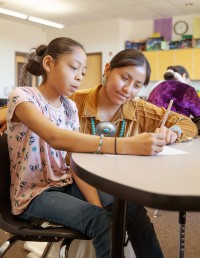Advocates for Children with Disabilities and Oregon Dep’t of Education Reach Interim Agreement
Advocates for children with disabilities and the Oregon Department of Education (ODE) have reached an interim settlement agreement in a class action lawsuit. The parties share a commitment to ensuring that public school children in Oregon receive a free appropriate public education in the least restrictive environment (LRE). The agreement requires the parties to select an expert to examine the use of shortened school days for students with disabilities across the state. The expert will issue a report that describes the use of shortened school days and recommend additional actions, if any, that ODE should take to ensure that all children receive an appropriate education in full days of school.
Once completed, the expert’s report will be submitted to both sides in the lawsuit and will be available to the public. Following that, the parties will discuss a comprehensive settlement in light of the expert’s findings and recommendations.
The National Center for Youth Law (NCYL), Council of Parent Attorneys and Advocates (COPAA), Disability Rights Oregon (DRO), the Bazelon Center for Mental Health Law, and pro bono attorneys filed the lawsuit, J.N. v. Oregon Department of Education, in January 2019. In response to the interim agreement, the plaintiffs released this statement:
“We are heartened by this interim agreement. With the right supports for teachers and students, virtually all children can learn in school alongside their classmates for a full school day. Students with disabilities are no exception. Ensuring that students with disabilities are included in school for a full day will give them the foundation that they need to thrive in their classrooms and communities for years to come. We look forward to working with the ODE toward this shared goal.”
Tom Stenson, deputy legal director for Disability Rights Oregon, commented: “Attending a full day of school positively shapes a child's learning and development today and profoundly influences their life for years to come. No student with a disability should face a significant risk of being placed on a shortened school day. Our agreement with the ODE is a strong step toward final resolution of this class action lawsuit paving the way for hundreds, if not thousands of children across the state, to attend a full day of school.”
ODE Director Colt Gill issued the following statement in response to the agreement:
The ODE is thankful for the plaintiffs’ good faith efforts to resolve this lawsuit. We are hopeful that this interim agreement will enable both parties to ultimately resolve plaintiffs’ concerns. Children experiencing disability are entitled and deserve to receive a free appropriate public education in the least restrictive environment. For the vast majority of students experiencing disability that should be a full school day. While it may be appropriate for IEP teams to abbreviate a child’s school day consistent with applicable law, these placements should be both rare and limited in frequency and duration. We look forward to engaging with the consultant as they evaluate the use of shortened school days in Oregon and considering the findings alongside plaintiffs to inform a potential comprehensive settlement agreement.
The expert will review relevant state records and data, interview state and local school staff, and engage in targeted site visits to review student files and observe students in classrooms. The expert will identify, among other things:
- Where, when, and why children with disabilities do not attend a full day of school;
- Uses of shortened school days that may violate federal law, including the Individuals with Disabilities Education Act (IDEA), which guarantees special education to children with disabilities who need it, and the Americans with Disabilities Act (ADA); and
- What, if anything, the ODE should do to ensure that school districts and teachers can support students with disabilities to successfully attend school for a full school day with their classmates.
###
The National Center for Youth Law is a non-profit law firm that works to build a future in which every child thrives and has a full and fair opportunity to achieve the future they envision for themselves. [www.youthlaw.org]
The Council of Parent Attorneys and Advocates (COPAA) is an independent, national nonprofit organization of parents, attorneys, advocates, and related professionals. COPAA’s national network of 2,800+ members work to protect the legal and civil rights of students with disabilities and their families. COPAA members are at work wherever the voices of families and students need to be heard. COPAA supports them with resources, training, and information to assist in obtaining the equal opportunity for education those children deserve and are entitled to under federal law. [www.copaa.org]
Disability Rights Oregon upholds the civil rights of people with disabilities to live, work, and engage in the community. The nonprofit works to transform systems, policies, and practices to give more people the opportunity to reach their full potential. For more than 40 years, the organization has served as Oregon’s Protection & Advocacy system. [www.droregon.org]
The Bazelon Center for Mental Health Law is a national advocacy organization representing people with mental disabilities. It promotes laws and policies that enable people with psychiatric, intellectual, or developmental disabilities to exercise their life choices and receive the supports they need to participate fully in their communities. [www.bazelon.org]






